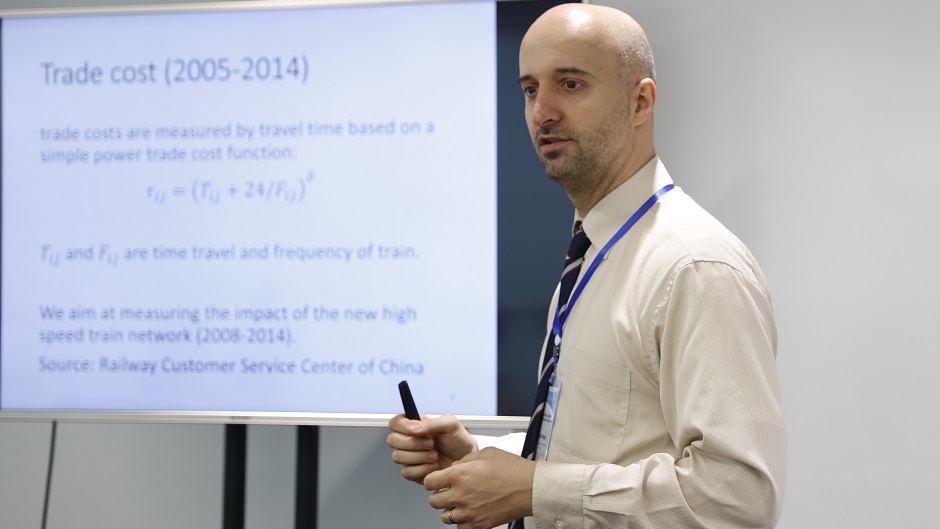05 Jun 2019
China’s huge investment in high-speed rail has made the cities it connects more populous and wealthier, according to Dr Paulo Regis of Xi’an Jiaotong- Liverpool University’s International Business School Suzhou (IBSS).
Dr Regis (pictured below) presented his early research findings on the link between high-speed rail and economic growth in China at the 7th International Seminar on Asia and Pacific Economies held at XJTLU on May 31 to June 1.

“The new rail technology has created massive change in the speed of train travel, which has gone from about 120 kilometers per hour to 300 kilometers per hour. This speed directly influences the cost of migration, increasing the magnitude of migration flows among cities,” he says.
“Our research shows that when travel speed to a city increases this dramatically, more economic migrants will move to it, despite the Chinese hukou system which regulates such movement.
“This stimulates the economy – more workers provide more job output and more production.
“Besides the economic impact of new workers, the infrastructure investment itself also increases wages and stimulates the economy.
“The wage differentials themselves are impacted, because with high-speed rail, it is easier to transport goods as well as people.”
To study the impact of China’s injection of funds in high-speed rail, Dr Regis and his colleagues compared actual results from the 2008-2014 investment to economic models showing results of theoretical scenarios. One of the theoretical scenarios shows what might happen if China built high-speed rail stations in cities that currently use only older rail technology.
“If more cities got high-speed rail stations, the economic model shows that those cities and their surrounding areas would also become wealthier,” Dr Regis said.
“With investment into more hubs, we found that economic activity would be even more concentrated into big cities.
“This will increase disparities because richer regions get even richer.”
If all the cities that now have only older rail technology got high-speed rail, Dr Regis says China’s south could become richer than the north – creating a new wealth distribution pattern in China.
“It is well known that the eastern region of China is richer than the west,” Dr Regis explains.
"However, our simulation suggests the imbalance of economic activities in the future is caused by the disparities of labor force between the south and the north rather than east and west.
Dr Regis was one of a number of speakers who presented a total of 30 academic papers at the round-table event organised by XJTLU’s IBSS and the Asian Development Bank Institute. The ADBI is a think tank based in Tokyo, Japan, which works with policy makers to identify strategies to reduce poverty and promote growth.
The annual event explores topics in international economics, with the Asia and Pacific region and the Chinese economy a special focus. The seminar is part of the efforts of IBSS to promote research in these themes and built a network of researchers in the Asia and Pacific region. It serves as a forum for researchers to present papers and develop joint research.
Topics discussed at the round-table seminar this year included financial development in Asian countries, the Chinese economy, infrastructure in Asian countries, international trade, development in Southeast Asia, and University of Liverpool special sessions.
Besides the coordinating institutions, attendees included representatives of the World Bank, Reserve Bank of India, Asian Development Bank, Association of Southeast Asian Nations (ASEAN)-Japan Centre, Institute for Social and Economic Change (India), Bangladesh Institute of Development Studies, Journal of Asian Economics, Southwestern University of Finance and Economics (China), Central University of Finance and Economics (China), Wuhan University (China), Nanyang Technological University (Singapore), Huazhong Agricultural University (China), University of Liverpool (United Kingdom), University of the Thai Chamber of Commerce (Thailand), Indiana University South Bend (United States), Jilin University (China), University of Illinois (United States), Paris School of Economics (France), Hunan University (China), Nankai University (China), Utrecht University (Netherlands), Sun Yat-sen University (China), Keio University (Japan), University of Westminster (United Kingdom) and University of Missouri (United States).

Some of the presenters are pictured below.

Dr Qu Feng (pictured above), Nanyang Technological University (Singapore), presented a paper titled ‘Comparing Econometric Analysis with Machine Learning Approaches: A Study on Singapore Private Property Market.’

Dr Peter Morgan (pictured above), senior consulting economist and vice chair, Asian Development Bank Institute, presented a paper titled ‘Determinants and Impacts of Financial Literacy in the Lao PDR.’

Dr Wei Xiao (pictured above), Southwestern University of Finance and Economics (China), presented a paper titled ‘Agricultural Land and Occupational Choices: Evidence from Rural China.’

Professor Wei Zou (pictured above), Wuhan University (China), presented a paper titled ‘Glass Ceiling for Poor Children: The Effect of Family Background on Children’s Schooling in China.’

Dr Yang Chen, XJTLU (pictured above), presented a paper titled ‘Spatial Innovation Co-Location between University and Firm: Micro Perspective from Patent.’

Professor Alexander Lord (pictured above), University of Liverpool (United Kingdom), presented a paper titled ‘Virtuous or Vicious Circles? Exploring the Path Dependence of Developer Contributions in England.’

Dr Sasiwimon Paweenawat (pictured above), University of the Thai Chamber of Commerce (Thailand), presented a paper titled ‘Household Economic Prudence in Thailand.’

Dr Yiquan Gu (pictured above), University of Liverpool (United Kingdom), presented a paper titled ‘Data Brokers Co-opetition.’
By Tamara Kaup, photos by Liping Tian
05 Jun 2019
RELATED NEWS

XJTLU provides executive training to one of world’s largest multinationals
Sodexo – a leading multinational corporation in food services and facilities management headquartered in Paris – has chosen Xi’an Jiaotong-Liverpool Universi...
Learn more








